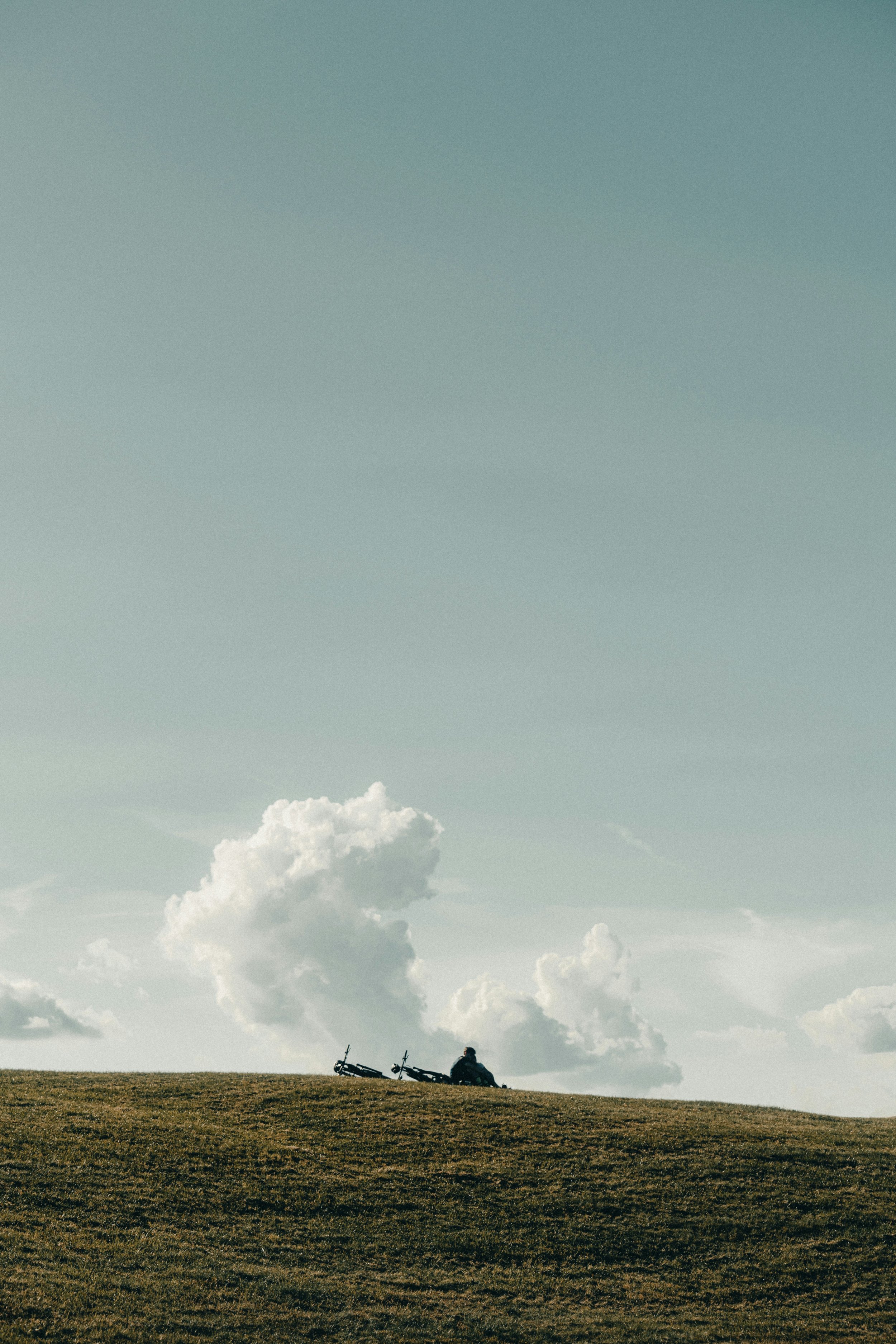Ultimately Insatiable

Ultimately Insatiable
Claire Nelson
On the Crazed Neurology of Social Media
TikTok is the means by which my generation became itself. The culture of Gen Z was formed through an insular language of emojis employed in comment sections with linguistic wit; through popular creators who vie for some ephemeral hype; through incomparably funny bite-sized videos shared with friends via group chats; through the virtual crusade to end systemic inequities.
For a long time, I was something of a TikTok enthusiast. My identity as a member of my generation was forged through the app. I’d spend hours alone in my bedroom scrolling through my For You Page feeling as connected to the stranger on the screen as I would a friend laughing right there beside me. Whenever someone around my age told me they weren’t on TikTok, I pitied them. To abstain from it was to exclude yourself from the collective coming-of-age of the modern adolescent.
But one day out of nowhere, I was overcome with a visceral sense of my own impending doom. The emotion’s sheer ferocity made me feel that I had lost control of myself internally and that I was no longer tethered to anything real. I felt like I was endlessly spiraling further into despair, like I had no agency or hope. In the days, weeks and months that followed, these feelings of anxiety, depression, dissociation, and existential dread continued and worsened.
Ironically, I learned the terms dissociation and existential dread from TikTok. You can learn a lot about my generation from TikTok comments sections. Often you’ll often find users making deadpan jokes about their great mental anguish and commiserating with the many others in the same boat. Social media at large has become a means by which people seek assurance that they aren’t alone in their suffering.
And for advice on the pernicious mental illnesses of the social media generation, you can look no further than… social media itself. There, you’ll find a plethora of mental health content. Some of it even comes from qualified psychologists earnestly trying to help a generation that suffers from anxiety, depression, and suicide at record rates. And what do these social media mental health experts advise? Oftentimes, it’s to take a break from social media.
*
In Generation Z and society at large, there is a vague but deeply-felt sense that social media is bad for people’s well-being. But the explanations for its harms are highly reductionist. They generally go something like this: users publicize only the highlight reel of their life, their best and most glamorous moments, causing others to suffer from comparing their worst moments, their real and unfiltered lows, to an idealized, curated public image. Proponents of this narrative contend that the rampant social comparison on social media is solely to blame for heightened rates of anxiety, depression, and suicide among young people. Even The Social Dilemma, the Emmy award-winning film that brought social media’s harmful effects to the forefront of public consciousness, utilized this framework in its portrayal of social media’s mental health effects.
I virtually never felt the sting of social comparison that is routinely indicted for social media’s mental health toll. On the contrary, I always felt my Instagram was a rather liberal representation of my social status, and if anything it only seemed to boost my self-esteem. My experience of social media was mostly positive. I delighted in scrolling through my Instagram feed for hours, in reading one expertised Twitter pundit’s take after another.
When social media’s negative mental health effects are discussed, they are almost always framed as solely the product of social comparison. According to this logic, if you do not consciously experience insecurity because of social media, you are spared from its negative mental health effects. But what then of the many social media users who, like me, enjoy spending time on social media? Are such individuals free to use it without consequence to their mental health?
In my experience, the answer is a resounding no. My mental health crisis came about suddenly without clear external cause. Before it, I had enjoyed relatively good mental health for years. Perhaps the only thing that could have foreshadowed it was a pattern in my TikTok usage. I generally spent two to three
hours a day on the app, but occasionally I’d exceed this, spending three or four. On such days, after mindlessly scrolling for hours, I would notice a dreadful numbness behind my eyes, a sense that my face could collapse into itself from exhaustion. Looking back, I recognize that this feeling was itself reminiscent of how I felt when depressed.
Ask any member of Generation Z to show you their screen time report. I’ll bet they spend at least four hours on various social media platforms everyday (and that’s being conservative). And whether they’re on TikTok, Instagram, Twitter, Snapchat, YouTube, or even the seemingly benign Be Real, the experience is fundamentally the same: users are presented with an endless series of unrelated ideas that require minimal attention and produce maximum neurological stimulation. Each bit of content forms a haphazard education that ultimately builds towards nothing but a restless insatiability for more of itself.
Social media puts my mind into a sort of crazed neurological buzz. When I use it regularly, I find my mind jostled by a ferocious torrent of its own thoughts. In this state, the world becomes exceedingly threatening, as I am inclined to indulge catastrophes real and imagined. I am plagued by an unshakable premonition, a detachment from my life and its contents, and a vague but persistent apathy towards this lackluster world.
*
In the past few years, it has become increasingly difficult for me to read. If I’m honest, it’s sometimes even difficult for me to steady my mind enough to closely follow a conversation. For this reason, I was particularly troubled by Flow: The Psychology of Optimal Experience by Mihaly Csikszentmihalyi. The text is regarded as a classic in positive psychology, a subdiscipline purposed with maximizing human flourishing. It asserts that the best, most desirable moments in life are those in which concentration is deployed without interruption in pursuit of a challenging goal. Under these conditions, across cultures and preferred activities, people experienced “flow,” a state characterized by “a sense of exhilaration, a deep sense of enjoyment that is long cherished and that becomes a landmark in memory for what life should be like.”
My concern came when I learned that rapt concentration was a precondition for flow. Spending hours daily on social media for years had so whittled my attention span that I felt barred from the deep, slow-burning delights Csikszentmihalyi extolled.
It was in great desperation for anything to lessen my mental anguish that I started meditating. I’d heard meditation was shown to physically decrease parts of the brain associated with depression and anxiety, and Csikszentmihalyi cited it as a flow-conducive activity. The practice had no immediate effect upon me, but I kept at it, and over months, I watched my despair giving way to a newfound stillness of mind. I was always amazed by the way the practice transformed my inner world. It did not function therapeutically by helping me to more productively think through my anxieties. Instead, meditation gifted me an effortless, uncircumstantial joy. In its wake, my deep seated inclinations to catastrophize and endlessly fret my life’s potential for ruin all but melted away.
Six months after I started meditating, I stopped using social media. In the first week of my abstinence, my concentration improved more than it had in the entire six months I’d been meditating. Now, nothing brings me more peace than a few hours of reading. And it is not the peace of tranquility or solitude, but that of a centered and quieted mind.
Even now, starting to read is always something of a labor for me. When I first open the book, processing each sentence feels like a conscious cognitive decision and the story exists mostly just as words on paper. But when I stick with it for one hour, two hours, three, I witness the story become the substance of life and truth. My initial resistance gives way to an effortless and immersive engagement with the world behind the words. There is a distinct, unparalleled peace here. I am no longer an untethered consciousness rapidly skimming the depths of life. Instead the world comes into ordered wholeness, and I become one with its flow. This, as Csikszentmihalyi taught me, is the fruit of concentration.
I now view the flow state as social media’s antithesis. Leading social media critic Cal Newport has even argued that spending enough time in a state of continuously fragmented attention can permanently reduce your capacity for sustained attention. Many of us lack the stillness of mind to read a book. Our craven brains rush to fill any and all quiet moments with another hit of stimulation. Then, even when we try to engage in a meaningful task, we experience such pronounced resistance that we are inclined to abandon the effort entirely. It can feel like we’re trapped within these perpetually shallow patterns of stimulation and dissatisfaction, barred from that which makes life peaceful, rich, and good.
*
It’s been over two years since my mental health crisis. I’ve since remained almost entirely off social media, continued meditating for 30-60 minutes daily, written extensively, and read about fifty books. As a result, I have cultivated a stillness of mind I never would have known possible. I have fully recovered from my depression, and I’m even able to make what is in my generation a rare boast: that I am happy. Because of the ways I have learned to harness concentration for my well-being, I have a deep confidence that I will never experience another depressive episode. Having abandoned social media and cultivated stillness of mind, I don’t believe my brain is capable of suffering to the extent it was when I used social media regularly.
I passionately believe that the high rates of anxiety, depression, and suicide in my generation are not solely a function of social media-fueled social comparison. Moreover, I believe that the problem runs deeper than even social media itself. In this attention economy, it feels like the whole world is conspiring to remove us from that which will bring us well-being. Yesterday my job as a journalist required me to conduct extensive research for a piece. This research consisted of surfing the Internet for five hours in an attention-fragmenting manner akin to that of social media. I awoke today with a pronounced tension behind my eyes and relentless frustration directed towards the world at large.
Whenever I feel like this, I try to take at least an hour engaging in an activity that is conducive to flow. Today, I read for about two hours and spent another two working on this piece. By the time I finished writing, my spirits had already been lifted. The evening sun was shining vibrantly, and I decided to go on a walk. On it, I spent about thirty minutes praying diligently, returning my mind back to the subject of my petitions each time it wandered. Then I started meditatively observing the natural world around me. Mindfulness enables nature’s subtle delights to assume epic proportions, and I’ve grown rather obsessed with admiring the leaves on the trees, the way the sunlight shrouds them in gold. Here, I felt an embodied peace emanating from deep within, a visceral sense that the world was whole, safe, and good.
Claire Nelson
Student & Writer
Claire is an undergraduate student studying English, and she has written for the Minnesota Daily and the Pioneer Press.
Photography by Martin Błaszkiewicz




